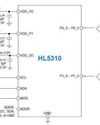
Remember the old eight-track players in cars? They were quirky and idiosyncratic. But today's in vehicle infotainment systems are packed with features and aimed at keeping the driver's eyes on the road. Why is it we can't design a system to remove all our concerns?
(W - "...to heaven." e begin our story with hypothetical music playing)
"And she's buying the stairway..." silent pause... click-click... silent pause That was a sample of an epic rock theme played back on eight-track stereo system in a partially restored 1972 Chevy El Camino (Figure 1). Does anybody remember the old eighttrack players in cars? They were great when they came out, but they had that quirky, inherent flaw: Every time the track switches over to the next one, it would randomly disrupt a song in the middle, inadvertently taking the wind out of the sails of an ambitious crescendo. Consumers put up with this quirk until the cassette decks came out because it was an important innovation. It saved them from having to listen to commercials on the radio in between songs, and then have more control over the music they listened to.
But what seems silly, here and now in the year 2024, we - as a society - still can't figure out how to deliver an ideal vehicular entertainment system - one that doesn't cut out at inconvenient times like a clunky pause in the middle of a song's dramatic conclusion in Figure 2.
Entertainment systems in cars are still highly controversial. We love them when they work, but when they don't, they could be the most vilified embedded system ever created. Not only that, but drivers seem more distracted than ever, and the user interface with in-vehicle infotainment systems seems to get more perplexing with every new generation of added features.
This story is from the {{IssueName}} edition of {{MagazineName}}.
Start your 7-day Magzter GOLD free trial to access thousands of curated premium stories, and 9,000+ magazines and newspapers.
Already a subscriber ? Sign In
This story is from the {{IssueName}} edition of {{MagazineName}}.
Start your 7-day Magzter GOLD free trial to access thousands of curated premium stories, and 9,000+ magazines and newspapers.
Already a subscriber? Sign In

Renesas New RA8 Entry-Line MCU Groups Brings High Performance of Arm Cortex-M85 Processor to Cost-Sensitive Applications with Market-Leading CoreMark Performance
Renesas Electronics Corp., a premier supplier of advanced semiconductor solutions, introduced the RA8E1 and RA8E2 microcontroller (MCU) groups, extending the industry's most powerful series of MCUs.

Same Sky Expands AMT Absolute Encoder Line to Support Larger Shaft Sizes
Same Sky's Motion & Control Group announced the addition of a new series to its innovative AMT absolute encoder family designed to support larger motor shaft sizes from 9mm to 15.875mm (5/8 inch).

XP Power Launches New Series of Low-Profile, Baseplate-Cooled DC-DC Brick Converters
The RDF150 and RDF200 series are the latest additions to the RDF series of low-profile, baseplate-cooled, ultra-wide input DC-DC brick converters, which is already available in power outputs of 25W and 50W.

HMI Introduces Ultra-Low Voltage 12-bit GPIO Expander with Interrupt Output
HMI, a leading provider of advanced analog and power management technologies, announced the launch of its HL5310, an innovative ultra-low voltage 12-bit GPIO expander featuring interrupt output.

The Future of Embedded Chip Design Navigating the Chip Creation Space
Custom Silicon at Lower Cost, Reduced Development Time

The Long and Winding Road
From Maxim's RS-232 to WeMos ESP32: So Much to Do, So Little Time

Start to Finish Driving LCDs
Lumex Display with Microchip Driver for a TI MCU

Easing the Path for App Releases
Managed Development of React Native with Expo

Datasheet: Tiny Embedded Boards
Deliver Power, Performance, and Versatility in Meager Square Millimeters

Harvesting Ambient Energy
Hybrid Power Sources Cut IoT Battery Dependency